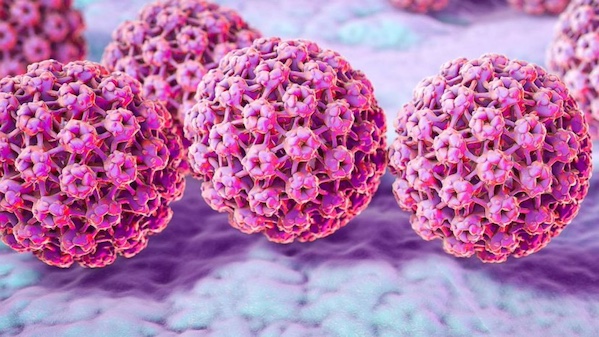HPV DNA Test Using Lymphatic Fluid Collected After Surgery Could Predict Risk of Cancer Recurrence
December 14, 2023
Source: drugdu
 327
327
 Head and neck cancer, previously linked to heavy drinking and smoking, has seen a significant shift due to human papillomavirus (HPV). In fact, HPV-positive oropharyngeal squamous cell carcinoma (OPSCC) has become the most prevalent HPV-related cancer, surpassing cervical cancer, with increasing cases globally. Despite treatments, up to 30% of head and neck cancer patients face recurrences, often due to elusive cancer cells that treatments miss. Recently, the focus has shifted to liquid biopsy for detecting cancer recurrences post-treatment. Liquid biopsies search for cancer indicators in body fluids like blood and urine. Now, a new study has found that liquid biopsy of lymphatic fluid, which is commonly thrown away post-surgery, could be key in tailoring treatments for HPV-driven head and neck cancer.
Head and neck cancer, previously linked to heavy drinking and smoking, has seen a significant shift due to human papillomavirus (HPV). In fact, HPV-positive oropharyngeal squamous cell carcinoma (OPSCC) has become the most prevalent HPV-related cancer, surpassing cervical cancer, with increasing cases globally. Despite treatments, up to 30% of head and neck cancer patients face recurrences, often due to elusive cancer cells that treatments miss. Recently, the focus has shifted to liquid biopsy for detecting cancer recurrences post-treatment. Liquid biopsies search for cancer indicators in body fluids like blood and urine. Now, a new study has found that liquid biopsy of lymphatic fluid, which is commonly thrown away post-surgery, could be key in tailoring treatments for HPV-driven head and neck cancer.
The groundbreaking study by researchers at University of Pittsburgh (Pittsburgh, PA, USA) and Washington University School of Medicine in St. Louis (WUSTL, St. Louis, MO, USA) revealed that HPV DNA in lymphatic fluid, collected after surgery, is a significant biomarker for predicting cancer recurrence risk. This discovery could guide decisions on intensifying or reducing treatments for HPV-positive head and neck cancer patients. Typically, after tumor removal surgery, patients have a surgical drain to prevent lymphatic fluid accumulation. This fluid is generally discarded, but the study found it contains crucial information. The research involved over 100 patients undergoing treatment for HPV-positive OPSCC.
The research team collected lymphatic fluid 24 hours post-surgery and compared it with blood samples. They analyzed cell-free DNA (cf-DNA), which is genetic material not contained within cells but instead freely floating in fluid. A striking 78% of lymphatic fluid samples contained cell-free DNA from HPV (cf-HPV), compared to only 12% in blood samples. Notably, cf-HPV levels were exponentially higher in lymph than in blood, indicating lymphatic fluid's superior sensitivity in detecting cancerous DNA.
Post-surgery, patients often require additional radiation or chemotherapy to eliminate remaining tumor cells. Clinicians typically rely on surgical pathology, inspecting lymph nodes and surgical margins for malignant cells, to decide on these treatments. The study found that lymphatic fluid analysis closely reflected this gold standard. The presence of cf-HPV in lymphatic fluid closely corresponded with the number and severity of cancer spread to lymph nodes. Patients with no metastatic lymph nodes showed no detectable cf-HPV. While surgical pathology is insightful, it can sometimes be subjective and may not fully capture the cancer's aggressiveness – a gap that is effectively closed by the new test.
The team also developed a machine learning model to forecast progression-free survival, determining which patients might experience recurrence or remain disease-free. This model, incorporating cf-HPV from both blood and lymphatic fluid, along with pathology data and other patient details, successfully differentiated between low- and high-risk patients. Crucially, lymphatic fluid cf-HPV was a vital element of the model. The researchers are now focusing on validating and expanding their findings, including creating a lymphatic fluid-based test for HPV-negative head and neck cancer.
“This test doesn’t just replicate what pathology tells us, it gives us more information,” said co-senior author Aadel Chaudhuri, M.D., Ph.D. “We demonstrate that we can find aggressive cancers even when gold-standard pathology misses them. That’s what makes this test such a game changer.”
“We can use a liquid taken just 24 hours after surgery to predict which patients will eventually relapse and which ones will remain recurrence-free,” said senior author José P. Zevallos, M.D., M.P.H. “This could be incredibly valuable for making treatment decisions in the clinic.”
Source:
https://www.labmedica.com/molecular-diagnostics/articles/294799560/hpv-dna-test-using-lymphatic-fluid-collected-after-surgery-could-predict-risk-of-cancer-recurrence.html
Read more on
- The first subject has been dosed in the Phase I clinical trial of Yuandong Bio’s EP-0210 monoclonal antibody injection. February 10, 2026
- Clinical trial of recombinant herpes zoster ZFA01 adjuvant vaccine (CHO cells) approved February 10, 2026
- Heyu Pharmaceuticals’ FGFR4 inhibitor ipagoglottinib has received Fast Track designation from the FDA for the treatment of advanced HCC patients with FGF19 overexpression who have been treated with ICIs and mTKIs. February 10, 2026
- Sanofi’s “Rilzabrutinib” has been recognized as a Breakthrough Therapy in the United States and an Orphan Drug in Japan, and has applied for marketing approval in China. February 10, 2026
- Domestically developed blockbuster ADC approved for new indication February 10, 2026
your submission has already been received.
OK
Subscribe
Please enter a valid Email address!
Submit
The most relevant industry news & insight will be sent to you every two weeks.



